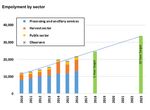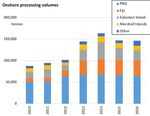Tuna Fishery Report Card 2018 - Pacific Islands Forum Fisheries ...
←
→
Page content transcription
If your browser does not render page correctly, please read the page content below
Tuna Fishery
Report Card 2018
Introduction
This Tuna Fishery Report Card provides high-level advice on the current status of Pacific tuna fisheries
in relation to the goals, indicators and strategies adopted by Forum Leaders in 2015 in the Regional
Roadmap for Sustainable Pacific Fisheries. The report card takes into account the work of the Task-
force on Increasing Economic Returns from Fisheries, which was established by the Forum Leaders to
develop a programme that will deliver real results within 5 years. Economic indicators now reflect Task-
force-agreed targets.
The information provided below indicates there has been continuing progress towards the achievement
of these goals and targets.
Goal 1 – Sustainability
The Roadmap provides a 3-year timeframe for the agreement of Target Reference Points (TRPs) for key
tuna stocks and a 10-year timeframe for the implementation of management measures to achieve these
TRPs in order to support economically viable fisheries. Three years into implementation only skipjack
tuna has a TRP agreed by the Western and Central Pacific Fisheries Commission (WCPFC). FFA members
have agreed a TRP for South Pacific albacore internally, but this has yet to be accepted by other WCPFC
members.
The ‘Majuro’ plot below shows the relative status of each of the main stocks against biological reference
points (black lines). The traffic light colouring is useful to provide a rapid indication of the ‘health’ of
each, with the overall intention to stay in the green and avoid the red. Following more positive scientific
advice on the status of the bigeye stock in 2017, all four major tuna stocks are now in the green “healthy”
area. However, there is a continuing need for current management arrangements to be strengthened or
supplemented to maintain this positive stock status.
“Majuro” Plot Target Species:
Skipjack tuna is not overfished and overfishing is not
occurring. The stock is above the Target Reference
Point.
South Pacific albacore tuna is not overfished and
overfishing is not occurring. While economic condi-
tions have improved slightly in recent years, the lon-
gevity of these improvements is unlikely without the
implementation of measures to control effort/catch in
the fishery.
Yellowfin tuna, according to the 2017 assessment, is
not overfished and overfishing is not occurring. No
work has been undertaken yet to determine a Target
Reference Point to ensure an economically viable fish-
ery.
Bigeye tuna stock, according to the latest assessment
undertaken in 2017, is NOT overfished and overfish-
ing is NOT occurring. The change in stock status is a
result of the incorporation of new information into the
scientific model, fisheries management measures and
favourable biological recruitment of new fish into the
stock.Other commercial species: Other commercially important stocks that have been assessed and require further management include southwest Pacific striped marlin and western and central pacific striped marlin. This Report Card does not cover Pacific bluefin tuna as that stock is rarely caught by FFA fleets or in FFA EEZs. As such FFA members have no real control over its exploitation and limited influence on the design of management measures. Bycatch: The objective for bycatch species such as sharks, turtles, marine mammals and seabirds is to signifi- cantly reduce capture. In longline fisheries the bycatch rate recorded by observers for sharks and tur- tles has decreased notably in recent years, which coincides with measures to reduce capture. However, assessments indicate concerns over the declining populations of several shark species including Silky shark and Oceanic Whitetip shark. Longline and purse seine and bycatch rates as measured by ROP observers in EEZs of FFA members Goal 2 – Value Increasing the share of the catch taken by FFA fleets by 25% over 5 years is the agreed Task- force Programme objective, both to increase eco- nomic returns and to strengthen coastal state control of the fishery. While the majority of the catch (both in quantity and value) in FFA Members’ waters continues to be taken by foreign vessels the share taken by FFA fleets has increased significantly in recent years, with the value share rising from 31% in 2013 to 45% in 2017, mainly due to increased participation in the purse seine fishery. Given these trends the 2020 target of 47% remains achievable.
Economic returns Economic returns to FFA member countries are measured through two components: government reve- nues from license and access fees and the contribution of the harvest sector to GDP. The 5-year goal is to increase each factor by 25% from 2015 levels. License and access fee revenue: The figure at right shows very large growth in the overall value of li- cense and access fee revenue. Under the current trend the 25% increase is likely to be achieved be- fore 2020. However, this growth has been achieved from purse seine vessels operating under the Vessel Day Scheme and this has slowed in recent years. The relatively low level of returns from the longline fish- ery indicates the challenges faced in achieving the economic potential of this sector. Contribution to GDP (value added): The contribution to GDP of the tuna fishery harvest sector (that is, fishing by domestic and locally-based fleets in all waters), after falling between 2012 and 2015 due to declines in fish prices, has since rebounded. In 2017 the contribution of the harvest sector to GDP of FFA members reached its highest recorded level. The recent increases have been driven by the purse seine fishery which saw continued increases in the catch taken by FFA fleets and significant increase in skipjack and yellowfin prices. In the processing sector in 2016 volumes remained flat at 2015 levels. Data for 2017 is not currently available. Goal 3 – Employment Total direct employment in the fishing industry (FFA Pacific Island members’ public and private sectors) continues to grow, providing 22,000 jobs in 2016 – an increase of around 6,300 since 2013. The Road- map anticipated an increase of 18,000 jobs from the 2013 total, with 9,000 new jobs created in the first 5 years, and the current trends indicate that these targets remain achievable. Importantly, the Road- map also focuses on ways to increase the spread of employment across FFA members, noting that it is very concentrated at present around the processing industry in Melanesia. There has been some growth in crew employment and new initiatives will seek to build on this trend.
Trade and Investment
The Taskforce proposed new initiatives to stimu-
late trade in tuna products and investment. It sug-
gested that growth in export values could be used
to measure progress. Estimates of export values
from FFA member countries are based on import
data from the major export destinations for tuna
from the region.
Following substantial growth from 2010 to 2012,
values fell each year up to 2015 due to falling pric-
es. In 2016 export values rose as fish prices recov-
ered. The target for 2020 for an increase of 25%
from 2015 levels was likely achieved in 2017 as a
result of continued growth in the value of catches
by the fleets of FFA members. Further diversifica-
tion of export markets is proposed.
Goal 4 – Food security
The Roadmap lays out a challenge to ensure an ad-
ditional 40,000 tonnes of tuna will be available for
regional consumption in 10 years. There have been
a number of initiatives to increase supplies of tuna
to local markets. These include increasing landings
from commercial fleets, with several countries re-
quiring licensed vessels to land to onshore bases
with by-catch going to the local market. The im-
portance of these tuna landings by commercial
fisheries will be examined in a study in late 2018.
In addition, many countries have programmes to
increase tuna catches by artisanal fleets (mainly
by provision of anchored Fish Aggregating Devices
(FADs). Recent studies have shown the importance
of canned tuna to local markets, with annual con-
sumption in the region’s three largest countries
ranging from 2,600 tonnes (Fiji), through 3,000
tonnes (Solomon Islands) to 3,300 tonnes (PNG) –
equivalent to 22,000 tonnes of whole tuna in total.
Pacific Islands Forum Fisheries Agency
No. 1 FFA Road, P O Box 629, HONIARA, Solomon Islands
Tel: +677 21124 Ext 221 Fax: +677 23995 www.ffa.int FFATuna @TunaFFAYou can also read



























































